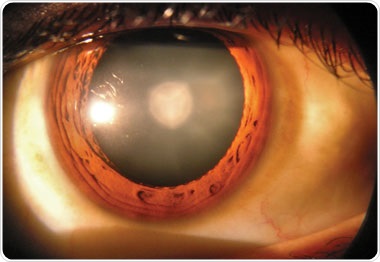Cataract Symptoms
Cataracts are cloudy or milky patches that develop in the lens of the eye and cause impaired vision.
As the patches grow in size or number, the lens becomes increasingly opaque, which affects the ability of light to pass through it and reach the retina. These opacities usually take years to develop and the symptoms of cataract generally present in older age.

When cataracts first start to manifest, symptoms are not noticeable but with increasing age some of the symptoms may start to affect one or both of the eyes. Some examples of these symptoms include:
- Blurring or clouding of vision
- Some patients may complain of small spots or dots or patches where sight is clouded
- Vision may be less clear in dim or less well-lit surroundings
- Similarly, vision may also be impaired in settings where light is very bright. The glare from bright lights may also be difficult to bear and may dazzle a person with cataracts.
- Sometimes, an affected individual has double vision or diplopia. This symptom may clear as a cataract becomes larger.
- A halo may be visible around bright lights, particularly at night.
- Colors may appear bleached or faded, with objects having a yellowish tinge to them.
- Tasks such as reading and watching television may become more difficult.
- People may find their glasses are less effective as visual aids.
- Some patients may have associated eye conditions such as watering of the eyes, drying of the eyes and itching.
Sources
- www.nhs.uk/conditions/cataracts-age-related/Pages/Introduction.aspx
- http://www.nei.nih.gov/health/cataract/webcataract.pdf
- www.nccah-ccnsa.ca/…/vision_cataracts_web.pdf
- http://www.aoa.org/documents/CPG-8.pdf
- http://whqlibdoc.who.int/bulletin/2001/issue3/79(3)249-256.pdf
Further Reading
- All Cataract Content
- What are Cataracts?
- What Causes Cataracts?
- Cataract Classification
- Cataract Treatment
Last Updated: Feb 26, 2019

Written by
Dr. Ananya Mandal
Dr. Ananya Mandal is a doctor by profession, lecturer by vocation and a medical writer by passion. She specialized in Clinical Pharmacology after her bachelor's (MBBS). For her, health communication is not just writing complicated reviews for professionals but making medical knowledge understandable and available to the general public as well.
Source: Read Full Article
